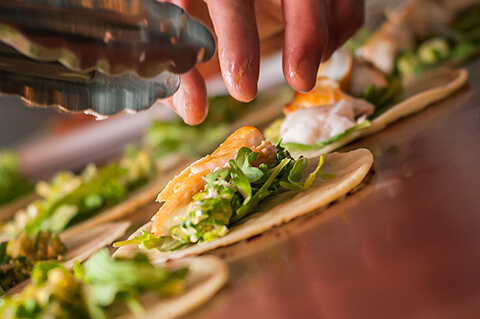On Earth Day, celebrate changes that make oceans healthier

Chef Ian Lai prepares an easy and delicious sablefish recipe (Credit: Barry J Brady Photography)
On April 22, we celebrate Earth Day. Choosing sustainable seafood is a great way to leave a smaller footprint on the planet. Here are some ways that supporting sustainable seafood improves ocean health and fishing and aquaculture practices.
Better fishing practices: The Pacific Groundfish Trawl Habitat Agreement has been recognized for its groundbreaking approach to reforming fishing practices to reduce bottom-trawling impacts on sensitive seafloor habitats. The trawl agreement, which the Foundation helped facilitate, is the first in the world to set up a quota system to limit habitat damage, especially to highly impacted deep water corals and sponges. There were just four fishing boundary infractions in the agreement's first year and the fleet's coral and sponge bycatch was only 10 per cent of the allowable limit. One of Canada's most criticized fisheries is now being recognized for its self-imposed regulations to reduce harmful impacts.
New approaches to reducing bycatch: Sometimes a simple idea goes a long way toward conservation. That's what the West Coast shrimp trawl fleet discovered when it began experimenting with LED lights on the front of trawl nets to reduce bycatch of endangered fish such as eulachon. After successful use of lights on American fishing boat nets, the Foundation worked with the trawl fleet to introduce the idea in Canada. The fear of exceeding eulachon bycatch limits restricted the trawl fleet from coming close to meeting its allowable shrimp catch. By reducing this concern, the fleet may be able to safely increase the amount of northern and pink shrimp caught and give consumers a sustainable option compared to the ubiquitous "red-listed" farmed Asian shrimp found at many Canadian grocers.
Raising fish on land: The environmental and health impacts of salmon raised in open net-pen containers pose serious concerns. SeaChoice recommends that people avoid these fish farm-raised Atlantic salmon. Land-raised alternatives can be a better choice. Raising salmon on land eliminates the need for antibiotics, protects the marine environment and wild salmon from contamination and requires 30 per cent less feed than open water salmon farming. Kuterra land-raised salmon grow in a closed containment recirculating facility in 'Namgis First Nation traditional territory near Port McNeill, British Columbia. Kuterra Atlantic salmon is available at Safeway seafood counters in Western Canada.
Fishing and aquaculture improvements that protect habitat, reduce bycatch and remove the worst impacts of open net-pen fish farming go a long way toward healthier oceans. Many Canadian grocery stores and restaurants are bringing in sustainable seafood products with SeaChoice or OceanWise labels. By choosing these products you're supporting positive changes on the water.
SeaChoice "best choice" options are now in more than 700 grocery stores across Canada. Ask your local grocer to bring in sustainable seafood options if they're not available. We can all play a role in supporting healthier oceans.
-The David Suzuki Foundation sustainable seafood team
Hey! Want more DSF? Join David Suzuki on Facebook

David Suzuki's Blog
- David Suzuki's profile
- 247 followers



